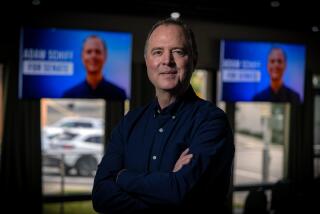CALIFORNIA ELECTIONS U.S. SENATE : Candidates Formally Open Campaigns in Media Ritual
- Share via
An election-year ritual begins Monday when U.S. Senate candidates who have been campaigning for office for a full year or longer stage formal tours of California to officially announce that they are running for the Senate.
The tours constitute something of a formal opening of the 1992 election campaign. Monday is the opening of the legal filing period for the two U.S. Senate seats at stake in California in 1992.
The practical reason for the ritualistic “fly-around” of the state, however, is to get the greatest media attention.
“The media usually gives you a ‘free’ day,” said Rose Kapolczynski, the campaign manager for Rep. Barbara Boxer (D-Greenbrae).
Boxer does not plan a tour, as such, but intends to begin making more public campaign appearances around California, Kapolczynski said.
Starting Monday, the secretary of state’s office will begin issuing candidate nomination forms. March 6 is the deadline for returning the completed forms, along with a filing fee of $2,502 for the Senate, or the signatures of 10,000 valid voters on nominating petitions in lieu of the fee.
State Controller Gray Davis will formally launch his campaign Monday with news conferences in Los Angeles, San Francisco and Sacramento. Lt. Gov. Leo T. McCarthy may follow soon afterward, his campaign managers indicated, although they declined to be more specific.
The most elaborate tour is being planned for Tuesday and Wednesday by Sen. John Seymour, the Republican who is running for the final two years of the Senate term from which Gov. Pete Wilson resigned to take office as governor.
Seymour will stop in Anaheim, Long Beach, San Diego and Ontario on Tuesday and Oakland, Fresno and Bakersfield on Wednesday.
Democrats Dianne Feinstein and Mel Levine probably will orbit the state’s media markets the first week in March. Feinstein is running for the two-year seat, while Levine, Boxer and McCarthy are seeking the six-year post of retiring Democratic Sen. Alan Cranston.
There used to be a practical reason for withholding formal announcements until the filing deadline. The Federal Communications Commission’s equal time rule inhibited office seekers, particularly incumbents, from making statements as formally declared candidates because broadcast stations were obligated to give their opponents equal air time.
By the time the rule was repealed, the California fly-around with reporters in tow had become a tradition of California politics.
But times may be changing again, said Kam Kuwata, Feinstein’s campaign manager, who worked in Senate campaigns in 1982 and 1988. With most news organizations working on reduced travel budgets, the tours no longer attract crowds of traveling press.
Although Feinstein plans a California tour, she also may schedule more frequent stops in regional media markets such as Monterey, the Inland Empire and Orange County, Kuwata added.
Some Senate candidates may make fewer public appearances this year because fewer reporters are covering them and because they need to devote more time to raising campaign funds, Kuwata said.
More to Read
Get the L.A. Times Politics newsletter
Deeply reported insights into legislation, politics and policy from Sacramento, Washington and beyond. In your inbox twice per week.
You may occasionally receive promotional content from the Los Angeles Times.










